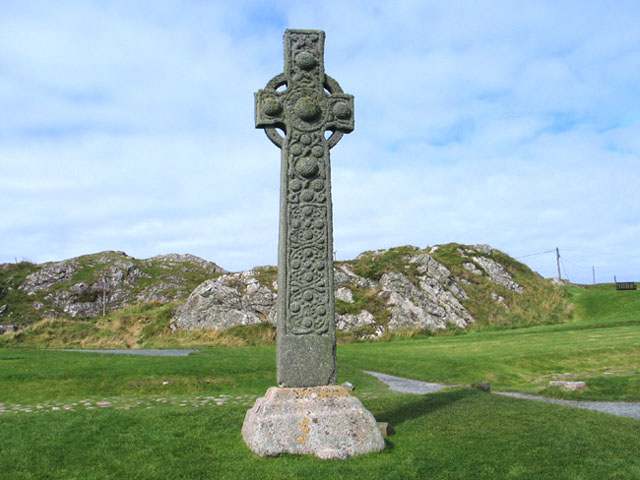Homily given on the Isle of Iona (where Br Haavar has been on retreat), Sunday 29th April:
Readings: Acts 4:8-12; Psalm 118; 1 Jn 3:1-2; Gospel John 10:11-18
We hear in the psalm of today a characteristic of God, not formulated by the Church or even the early Christians, but by the chosen people of God from the time of the old covenant.
The psalms we just heard says:
'Give thanks to the LORD, for he is good,
for his mercy endures forever.' (Psalm 118,1)
The Lord is good, and his mercy endures forever. The Hebrew word used for 'mercy' in this psalm is hesed. It is true that this word implies mercy, but the word contains much more. If we were to chose only one word to describe it, we would probably say that hesed means loving-kindness. It indicates a profound attitude of goodness, and this goodness surpasses an attitude of simply doing each other well; it also implies faithfulness rooted in an inner commitment.
Hesed then, is rooted in fidelity, and through this fidelity, love and grace is given and shared. Hesed expresses faithful love in the Old Testament, and so it naturally connects to the covenant between the Lord and his people. The covenant is rooted in God's hesed, and it implies faithfulness and care, but it is above all a love that remains constant regardless of the circumstances.
The loving-kindness of the Lord, the hesed, is repeated throughout the whole of the Old Testament. But from where has Israel got this expression?
The answer is: From God himself! When God passes in front of Moses on the mountain Sinai, during the great exodus from Egypt, the Lord himself proclaims:
'The LORD, the LORD, the compassionate and gracious God, slow to anger, abounding in loving-kindness and faithfulness, keeping steadfast love for thousands, forgiving iniquity and transgression and sin, but who will by no means clear the guilty...' (Exodus 34: 6-7)
Our knowledge of God's faithful loving-kindness is given us through God's self-revelation. God is loving-kindness because God tells us so. And he proves this again and again, until the final exodus, not the one through the Red Sea, but through death itself. God's loving-kindness is ultimately expressed in the revelation in Christ. Christ is the one who cares. He is the one who loves us without measure. He sees each one of us, he watches over us, he remains faithful. He is the good shepherd.
And Christ the shepherd is present in our lives and in the life of the Church. He is present when the word of the Lord is proclaimed. He is present in the celebration of the Holy Eucharist and in the Holy Communion we receive, but his presence goes farther. Christ is present in his Church, in his body, and when we come together to celebrate the very meaning of life given us in Christ, Christ is already here with us. We are surrounded by Christ, and we are filled with him: for the good shepherd does not leave us as orphans (John 14: 18).
Now, there is one dimension of Christ's presence that I have not yet mentioned, that is the role of the priest. It is true that the priest re-presents Christ in a special way. The words being said during the consecration are Christ's own words, and the priest prays on behalf of the community just as Christ prays for the chosen ones, the ones God the father has given the Son (John 6,37). And the priest has become so through the sacrament of Holy Orders. He is marked in an irreversible way.
I think of this quite a lot these days, because I am going to be ordained priest in Oslo in October this year, God willing. Being ordained priest implies a question of identity. Who am I, what will I become, and how will others see me? Am I going to be the good shepherd, like Christ? Will I possess authority, like Christ the King does?
Let me now just share with you an enlightening encounter that brother Arnfinn, prior of Oslo, and I had during this week here on Iona. We were having lunch down at the sea side when a little grey and white sheepdog came towards us. It had these very awake grey-blue eyes, and it was very playful. It disappeared, but suddenly came back with a little stone in his mouth that it dropped before our feet. 'Shall we play?' it asked, and got ready to sprint after the improvised toy. We totally fell in love with this dog, and we could easily see in this little fellow an example of a good Dominican; creative, curious, playful, ready to move, with good capacity of communication. Said in all humility of course...
Now, the Dominicans, if our name is written in Latin and then split up, becomes Domini canes - God's dogs. And that is exactly what a priest may be described as, and especially a Dominican priest, because we stand under the Lord's command, and on his word and signal, we do as the master tells us; go left, go right, go forth, around, guide, lead, encourage, and watch out, we might even bite a bit now and then... We are the Lord's servants, ready to do what we are told, and thereby following the example of him who laid down his life for us. Christ acts through his priest. Let us just pray that the priest always seek to act in Christ.
As it is today also the feast of St Catherine of Siena, let us give her the final words, as she summons up the loving-kindness of our Saviour:
O unfathomable depth! O Deity eternal! O deep ocean!
What more could You give me than to give me Yourself?"
(St. Catherine of Siena on the Blessed Sacrament)
bror Haavar Simon Nilsen O.P.

No comments:
Post a Comment